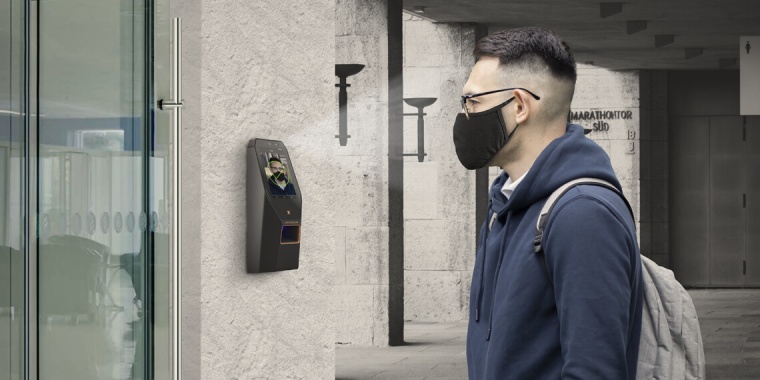Touchless Biometrics Help Sports Fans and Stadium Staff Play Ball with Healthy Access
Covid-19 forced many sports seasons to end abruptly. Others never had a chance to begin or were forced to play without fans, costing the industry billions of dollars in lost revenue from tickets and advertising, as well as weakening tourism to sports-centric cities. After nearly 18 months of limited in-person events, some stadiums are beginning to feel confident that fans can return to watch the sports they love in person thanks to medical innovation and infrastructure solutions for keeping fans and staff healthy.

From stadium workers and investors to players and fans, people are ready to get back to in-person games. While the pandemic persists, however, stadium management needs to work with their staff and fans to ensure everyone can enjoy a game without the fear of becoming sick.
Covid-19 Moved the Goalpost for Sports Security
With average seating capacities in the tens-of-thousands, stadiums pose some of the security industry’s most daunting challenges for system integrators. Some of the top needs of security and IT managers at stadiums are:
- Minimizing lines at entry points so fans can get to their seats
Getting fans seated quickly keeps stadium visitors happy and minimizes health, safety, and security risks at entryways like doors and turnstiles. Over-crowded entries can lead to heatstroke, injuries, and bad moods for fans, so choosing security options that allow for quick check-ins will help fans enjoy their experience. As social distancing is still a concern for many people, solutions that prevent crowding will show fans that stadium management cares about their wellbeing. Further, streamlining or speeding up the check-in process can help stadium staff be productive. After fans check in, security personnel can quickly move to other aspects of their duties during the game.
Automated security solutions will help keep people moving quickly. A single high-throughput device, such IXM Titan Enhancement Kit with a visitor temperature screening and mask detection throughput of up to 15 people per minute, can screen over 1,000 fans per hour. Multiply that by the number of stadium doors with an automated check-in device to determine the high-level efficiency of your fan check-in system!
- Securing staff and fans’ personal data
Privacy is a top concern with any security system, but it becomes even more important when a system is as public facing as fan security at stadiums. Whether the system uses QR codes, bar codes, fans’ personal phones, or biometrics, stadium management needs to know that their solution incorporates measures like encryption to prevent personal data theft from tens of thousands of people. As health information is now common to collect before large events, IT or operations management needs to take special care to ensure individual symptom or vaccination data is secure – in addition to personal information.
Security solutions that offer high-end encryption and communication protocols are one of the best methods to prevent hacks before they happen. Biometrics used for access control or workforce management alike should be encrypted before storage and during communication to protect personal data from breaches. For stadium staff, biometrics offer an additional layer of security compared to cards or PINs. When someone clocks in using a credential like face recognition, management can be confident that the person is who they say they are because of biometrics’ inherent security. This prevents or limits concerns like time theft, buddy punching, and other costly risks faced by a less-secure time tracking system.
- Streamlining security for regulars and one-time visitors
A stadium’s security system needs to be able to handle a large staff – many of whom might work for companies other than the stadium owner, such as concessions workers or the visiting team’s staff. It should be fast and easy for many employees from different organizations to register for access control or time tracking and then use the system for the duration of their work at the stadium, whether that’s just one weekend or multiple years on end. At stadiums, it’s essential for staff to get inside and get to work to prepare for the large crowds of fans they expect.
Biometric solutions with high throughput for large user capacities can help. IXM Titan leads the industry in authentication speed for up to 100,000 individuals (1:N face recognition) in less than 1 second. This speed means that a stadium’s entire staff, from security personnel to concessions, maintenance, cleaning, and more can all enroll for rapid, automated face recognition for time and attendance or access control that can help uphold the stadium’s productivity standards.
- Enhancing user experience with easy-to-use, digital, and remote features
Fans expect a lot out of their favorite sports venues. The industry already uses paperless ticketing, so at minimum, stadiums should continue their path toward a digital experience that allows fans to do as much of the check-in process as possible remotely to reduce the time they spend waiting in line for entry. Most fans will expect to self-report their vaccination status and symptoms of illness upon arrival to a public venue. This is now a common part of the live entertainment experience that stadium management should incorporate into their digitized remote check-in process, so stadium entry does not become a hassle due to COVID-19. Both digital and physical security solutions should be attractive to look at and easy to use, so the fans that interact with the technology have a positive experience.
Few solutions for healthy access are as easy to use as touchless face recognition and temperature screening (or elevated body temperature detection). For staff and fans, these workflows using IXM TITAN with Enhancement Kit are easy. Simply approach the device, and its on-board, intelligent cameras will simultaneously authenticate a person’s identity, measure their temperature at the tear duct, and check to see if a mask is being worn. Then, depending on the stadium’s preferred workflow, the person will be instructed to go to their seat, report for secondary temperature screening, put on a mask, or any other next steps needed.
- Keeping security costs down after a difficult year
With the massive decrease in revenue the industry experienced in 2020, stadiums’ budgets are tighter than ever for 2021 and beyond. Cutting costs without sabotaging the fan experience or overall security is critical, so stadium management should be seeking automated solutions that perform more than one function to answer as many needs as possible with a single complete solution – rather than increase man-hours needed for temperature checks during ticket-taking.
While biometrics ensure unmatched security, automation is a key factor in reducing the overall cost of maintaining a system. While hiring extra staff for temperature screening can cost hundreds of thousands of dollars per year, a one-time investment in an automated solution that combines temperature checks with access control, time tracking, self-reporting or attestation, and more can do the job of many individuals at once. This frees up time for your current staff to do other important tasks without creating a cumbersome experience for employees or fans. Look for systems that add more value by incorporating add-on features that help you track and analyze staff and fan data to assist in high-level decision-making and even contact tracing in the event of illness outbreak.
Invixium’s companion software, IXM Web, offers a wide range of licensed features to add value to each stadium’s unique biometric security system. IXM Time can help management track staff – even a large staff – to ensure each person is performing as productively as possible. IXM Health can track temperature screening data for registered individuals, such as employees, so management can take swift action and protect healthy staff if a health event occurs.
- Protecting the health of staff and fans while following government guidelines
Many governments still require temperature checks, masks, or self-reporting of symptoms before entering a public venue. Stadiums must adhere to this guidance to keep everyone who passes through their doors healthy without compromising on any of their existing needs, and many fans demand this high level of diligence from the venues they visit. The solution stadiums choose for health screening, attestation, and more needs to be compatible with the high levels of speed and security these unique businesses need.
Accuracy builds confidence. IXM Titan Enhancement Kit screens temperature at the tear duct, the skin surface location shown to correlate most strongly with core body temperature and limit the influence of ambient temperature. The Enhancement Kit’s on-board thermographic camera reads with an accuracy of ± 0.5 ⁰C (0.9 ⁰F), so management can rest assured that those who screen with a normal temperature are, in fact, healthy. And with room to grow built-in, Titan is ready to incorporate additional features that ensure the health and safety of every employee and visitor to the stadium.












